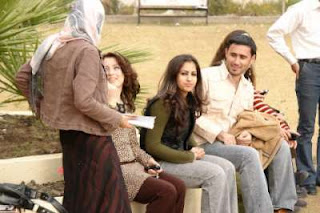Ramadan: Preparing Patients with Diabetes for a Better Fast

Ramadan is not about starving one’s self for 16 hours from sunrise to sunset during the exhausting heat of summer nor is it a mechanism to lose weight. Restraining from food or drink during the summer heat becomes worrisome for those who must work long hours. Don’t get me wrong, the growling noise of hunger and the itching throat of thirst are clearly present, but this is only a self-reminder to appreciate those who struggle from starvation. Muslims may choose to experience hunger for a month, but those less fortunate who do not have this choice may struggle with hunger throughout their entire life.
Fasting Ramadan comes with four key risks: hypoglycemia, hyperglycemia, dehydration and weight gain.
Hypoglycemia: The risk of experiencing hypoglycemia is highest in patients taking insulin or certain therapeutic classes of antidiabetic agents. Make sure your patient measures their blood glucose levels during fasting.
Hyperglycemia: While low level of blood glucose may happen during the long day of fasting, after the fast is broken at sunset, there is a great risk of overeating from the body’s starvation.
Weight Gain: Even though Ramadan is known as a time of fasting – it is not uncommon for people to gain weight during this month, as in some Muslim families, every evening meal is a celebration.
Dehydration: Dehydration is especially a problem during hunger and hotter summer days.
Based on the Holy Quran as well as the translation from Muslim scholars, there are certain groups of people who do not have to fast, especially if fasting puts their health at risk. This includes children, pregnant or breastfeeding women, the elderly, and anyone who might make themselves ill by fasting. This also includes people with poorly controlled diabetes, people with type 1 diabetes who take insulin, and patients with type 2 diabetes on a mixed insulin regimen, including those who often have very high or very low blood glucose levels. However, this does not mean that you will not encounter patients with diabetes who fast safely.
Here are a few steps to consider if you have a Muslim patient with diabetes who plans on fasting:
Meet with the Patient before Ramadan:It’s important to keep an open mind when you encounter a patient who is fasting as each person is different. The decision you and your patient must make during fasting depends on their type of medication. Patients can continue taking their diabetes medicine, but they might end up taking it at a different time. Their diet may also change. Therefore, as a provider, it’s important that you are culturally competent and aware of the concerns that come with fasting. Make sure that you have scheduled an appointment with your patient 1-2 months prior to Ramadan to discuss if fasting is safe for their overall health. As a provider, you might want to consider changing therapy plans for the patient if s/he insists on fasting the holy month. If your patient’s diabetes is well-controlled, there’s less of a health risk from fasting. If your patient is not on insulin or sulfonylureas, you should be less worried about fasting.
If your Blood Sugar Fluctuates: If your patient’s blood sugar fluctuates, let’s say 500mg/dL one day to 75 mg/dL another day, you will need to advise against fasting. Other types of patients that you should advise against fasting are pregnant women, those with a history of hypoglycemia and ketoacidosis, and those who perform intense manual labor.
Know When to Break your fast: Make sure you let your patient know that checking blood glucose does not break their fast. If their blood glucose falls below 70, recommend taking 15 grams of carbohydrate in the form of one of the following: 4 glucose tablets, 6 oz regular soda, 4 oz fruit juice or 1 tube glucose gel. Ask them to wait 15 minutes and recheck their blood sugar again. Follow with a snack if the evening meal is more than an hour away.
If you Exercise During Ramadan: Advise your patient to bring a sweet drink (like a juice box) or a small serving of candy with them.That’s because exercise can lower their blood sugar even further, and you want them to be ready to help treat that. Although most people with diabetes can exercise normally during fasting, you should avoid overdoing it, especially during the evening hours.
Listen to Your Body. Dark urine, a headache, nausea and vomiting can all be signs of dehydration. Advise your patients to consider drinking mineral water and caffeine free drinks throughout the evening after they break their fast. It’s highly recommended that you put the patient in touch with a dietitian.
Eat a Healthy Suhoor: For fasting patients, the Suhoor should contain a balance of whole grain sources of starchy carbohydrates as well as protein and fat to help slow the digestion and help the feeling of fullness last as long as possible into the day. Healthy Suhoor options for the hot summer month of Ramadan include: Whole grain cereal, low-fat milk, cottage cheese with sliced peaches topped with toasted almonds. Plain Greek Yogurt flavored with blueberries and cinnamon, whole wheat toast with nut butter. Foul (a hearty middle eastern breakfast dish made of lentils or fava beans), small serving of sliced fruit. Whole wheat roti (unleavened bread) and egg khagina (a southeast Asian dish)
Eat a Balanced Iftar: A meal that combines protein, fiber and healthy carbohydrates can help keep your patients’ body and blood sugar in balance at any time, but especially after fasting. Encourage your patient to eat sensible meal portions and follow the same guidelines for healthy eating that they do the rest of the year, with an emphasis on whole grains, lean sources of meat, fish and poultry, small amounts of heart healthy fats, and limited added sugars.



Comments
Post a Comment